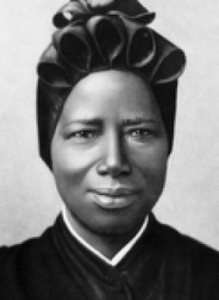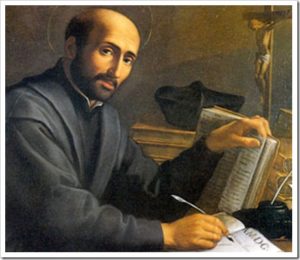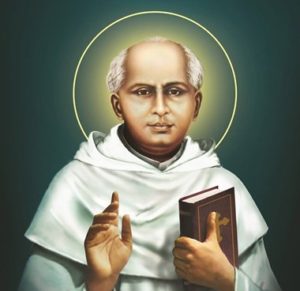Like Paul at Rome, Fr. Vaz was hunted through India and Ceylon (now Sri Lanka) like a common criminal. St. Ignatius of Loyola (1491-1556 AD) and St. Philip Neri (1515-1595 AD) burnt into Saint Joseph Vaz (1651-1711 AD). St. Fr. Joseph Vaz is India’s son of the soil who went on to become the patron Saint of Sri Lanka. It will be clear in a moment why we should study St. Joseph Vaz’s life in relation to St. Ignatius of Loyola. It is common knowledge that St. Vaz belonged to St. Philip Neri’s Congregation.
Hindu Scriptures (Prasthana Trayi) declare that a man of God owns no property; he keeps moving from place to place to cultivate detachment, does not meddle in the affairs of worldlings and practices holy reading or lectio Divina. St. Vaz, if seen through the Sannyasa Upanishads, was such a man; free from the bondage of samsara. He is (sic) a Paramhansa. The Son of Man had no place to lay his head; St. Joseph Vaz too had nowhere to rest and call his own in this valley of tears.

Like Saul at Rome, Fr. Vaz was hunted through India and Ceylon (now Sri Lanka) like a common criminal. Like the Lamb who was led to the slaughter, Fr. Vaz chose to be a burnt offering to YHWH for the love of his own countrymen and later, of the Sri Lankan people. The Other became one with the Self in the economy of salvation in the case of this Saint, as is the case with all Saints. Remember the slave girl who became YHWH’s own? Saint Josephine Bakhita (1869-1947 AD) overcame inhumanity with love, as Fr. Vaz overcame hatred at home and Sri Lanka with that love which has no finitude. Amor Vincit Omnia. There is not a single instance in human history where unconditional love has not finally defeated anger, injustice and hatred.
Fr. Vaz re-affirmed ẖesed in colonial India and Ceylon. There is documentary evidence that he protested Portuguese high-handedness in the Goa of his own times and lashed out against Dutch racial discrimination against the Ceylonese. Like St. Bakhita, St. Vaz allowed himself to be tortured but protested if colonisers tortured us, the colonised. The Communion of Saints is a communion of Love which is not afraid to stand up for the rights of others, be they Hindus or Christians.

If Fr. Joseph Vaz were alive today then he like Saints Ignatius and Philip Neri would study the zeitgeist and prepare himself like the Galilean prepared Himself in hiddenness and only then would Fr. Vaz go about redressing social injustices in India; he would keep opposing naysayers (nihilists) and then translate everything holy into Indian languages and upload them on social media. Like Saul, Fr. Vaz would write incessantly as he did while jailed by the State and when others feel insecure from this God-haunted man, he would certainly allow himself to be humiliated and flogged since no man can follow the Nazarene who does not deny himself and takes up his own cross. Fr. Vaz would have wanted all of India and Sri Lanka to experience mukti much in the same way that St. Ignatius of Loyola wrote his Spiritual Exercises so that all men can experience Ananda (bliss) which is paradoxically a battle unto death with evil, or the Maras.
St. Vaz was barefoot all his life and had very few material possessions. Minimalism is not a fad, it is a necessity in a world where leaving carbon footprints is a sin against the plenitude of God (vide Laudato si’, 2015). While we glut and waste food, the poor go this winter like so many past winters without food and heat. St. Vaz’s absolute poverty is a pointer to us to live simple lives and share our own tables with the poorest of the poor.

St. Ignatius of Loyola mentored St. Philip Neri; they recognized each other as missioned from Yahweh to counter the European Reformation. Both were determined to preserve the Roman Catholic Church from heresies and rebels, as before them St. Catherine of Siena (1347-1380) had successfully prevented the division of the Church of her times. While St. Ignatius wanted intellectually strong men to go about countering false doctrine; St. Philip Neri would incorporate the Ignatian magis in the Oratory that he begun with the caveat, that St. Neri’s priests would journey together with mandatory communal Adoration of the Blessed Sacrament and choir-recitation of the Divine Office. Along with the Society of Jesus, the Congregation of the Oratory of Saint Philip Neri to which St. Vaz belonged, would restore the primacy of the Holy Roman Catholic Church in a world which is always at the verge of slipping into moral relativism and other convenient nod-wink arrangements. Sts. Ignatius and Neri together pulled the Roman Catholic Church out of the miasma of the Protestant Reformation.
These Saints remind us of Sri Adi Shankaracharya (circa 8th century AD) who reestablished Hinduism (sanatana Dharma) after Buddhist intellectuals nearly annihilated Hinduism from India. St. Joseph Vaz is an heir to Adi Shankaracharya, St. Ignatius of Loyola and St. Philip Neri. Imbibing their zealous spirit and his own God-gifted intellect Fr. Vaz went to Sri Lanka and confronted Calvinist fatalism there. To intellectual rigour he combined the charism of St. Philip Neri. While discussing the Counter Reformation in Europe one hears mostly of the role of the Jesuits; yet it is important to understand that St. Philip Neri’s persona which shaped his Oratorians softened the harshness of the Ignatian Way of proceeding. Without St. Philip Neri, the Jesuits could not have won back the Catholic Church from Martin Luther (1483-1546). Fr. Vaz is an Indian who was missioned to Ceylon and that part of his life is for the Ceylonese people to document.

St. Vaz inspired the intellectual Saint Kuriakose Elias Chavara (1805-1871 AD). St. Chavara like St. Vaz defended Catholic dogma qua the Truth against Syrian schismatics. It is important to note that the Truth is One, though perceived as many by holy men — therefore all holy men and women of all religions are living oblations to this Truth which cannot be allowed to dim even if demonic forces wants it put off.
Both Saint Vaz and Saint Chavara made it a point to study the plural societies in which they lived and responded with agápē. Having studied Hinduism in some detail, both men decided to preach the Beatitudes as supplementing Hinduism rather than going about destroying Hinduism. It was and is impossible for European Saints to understand the dichotomies and co-existence of various religions in both India and Sri Lanka; thus, we need to remember Frs. Vaz and Chavara today since divisive forces would want us to imagine that there are real ‘clashes amongst civilizations’. It is because of such indigenous Indian Saints that in India it is impossible to ever snuff out the light of Christianity.
St. Vaz rapidly learned Tamil as later St. Chavara would learn Sanskrit not because they were proselytizing: it takes one to know the language of the people one loves to say I love you my brother and I will lay down my life for you if it helps you. It is not easy to learn the language of another people when one is in jail. It is not easy to love those who jail us. It is not easy to be St. Joseph Vaz. But as the Hindu Scriptures tell us and the Church’s doxology of Saints tell us: it is not impossible to be a Saint if one cooperates freely with God’s Grace.
Saints Ignatius, Philip Neri, Joseph Vaz, Elias Chavara and Josephine Bakhita form a communion of Love who transcend time and space and make real the scandal at the heart of Christianity. The Christian God, the personal broken God of the Christians will hang in shame from His wooden Cross till even one soul suffers and is in danger of being eternally lost.
This article has been kindly granted to Aleteia by our partners in India, Indian Catholic Matters. We encourage you to visit their full website, here.








